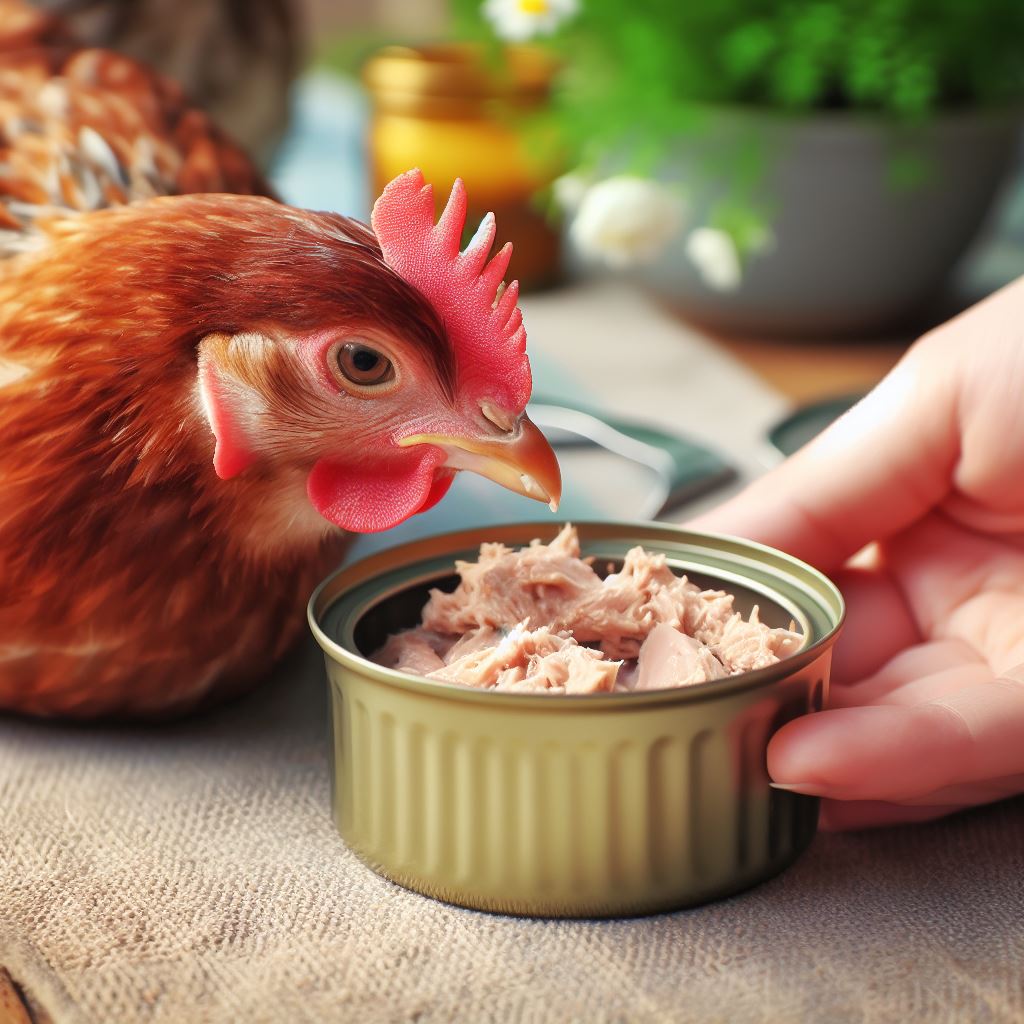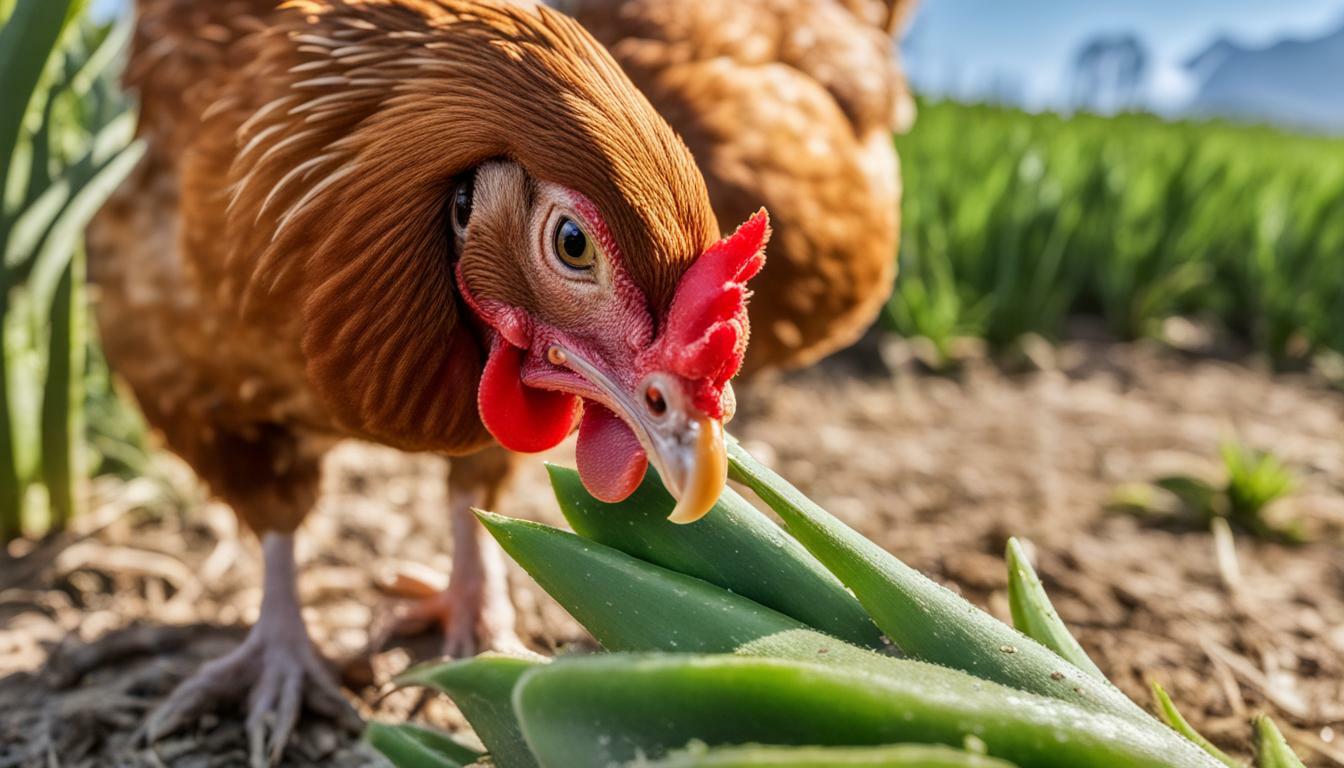Can Chickens Eat Fava Beans? Feeding Tips for Your Flock
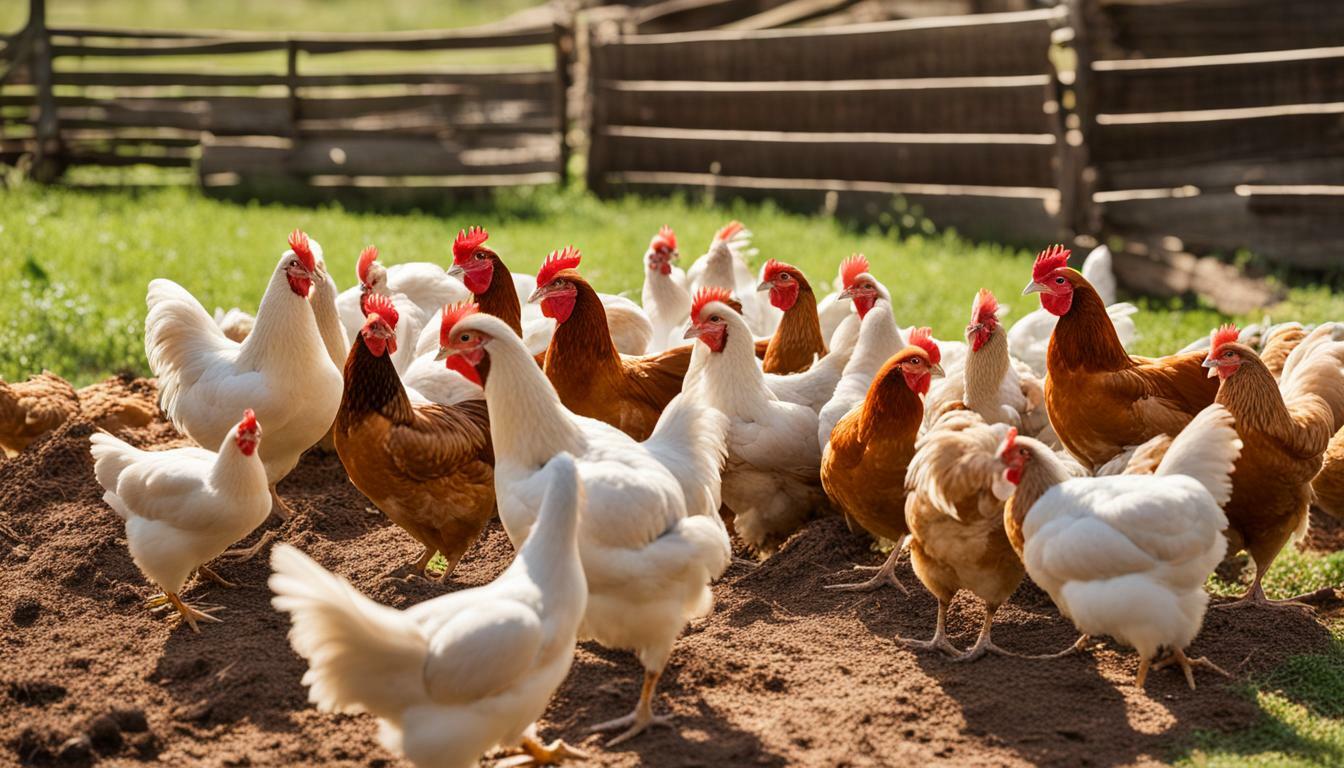
Table of content:
- An Overview of Fava Bean Nutrition for Chickens
- Potential Concerns of Feeding Raw Fava Beans
- Safe Feeding Guidelines for Fava Beans
- The Nutritional Benefits of Prepared Fava Beans for Chickens
- Feeding Fava Beans to Chickens in Practice
- Frequently Asked Questions about Feeding Fava Beans to Chickens
- Can chickens eat fava beans?
- Are fava beans good for chickens?
- Are fava beans safe for chickens?
- What do chickens eat besides corn?
- What vegetables can chickens eat?
- Can chickens eat beans and legumes?
- Can chickens eat all vegetables?
- What foods are poisonous to chickens?
- Are beans good for chickens?
- Can chickens eat raw fava beans?
- Should I soak or cook fava beans before feeding?
- How often can chickens eat fava beans?
- Can baby chicks eat fava beans?
- What other beans can chickens eat?
- Conclusion
Can Chickens Eat Fava Beans? Fava beans (Vicia faba), also known as broad beans, can make a nutritious treat or supplement for backyard chickens. These large beans are packed with protein, fiber, vitamins, and minerals that support chicken health. However, fava beans also contain anti-nutritional factors like tannins, phytic acid, and vicine/convicine that can cause digestive upset or toxicity if consumed incorrectly.
Key Takeaways:
- Fava beans contain many essential vitamins, minerals, and nutrients that can benefit chicken health. However, they also contain anti-nutritional factors that can cause digestive issues if fed incorrectly.
- Fava beans should only be fed to chickens in moderation after being soaked, sprouted, or cooked to reduce anti-nutritional factors. Never feed raw fava beans.
- Limit fava beans to occasional treats or supplements to a balanced diet. Too much can cause bloating, gas, nutritional deficiencies, or toxicity.
By taking proper precautions through soaking, sprouting, or cooking fava beans before feeding, chicken owners can safely use these nutrient-dense beans as part of a varied diet. When fed in moderation alongside a balanced base feed, small amounts of prepared fava beans can provide beneficial nutrition without adverse effects.
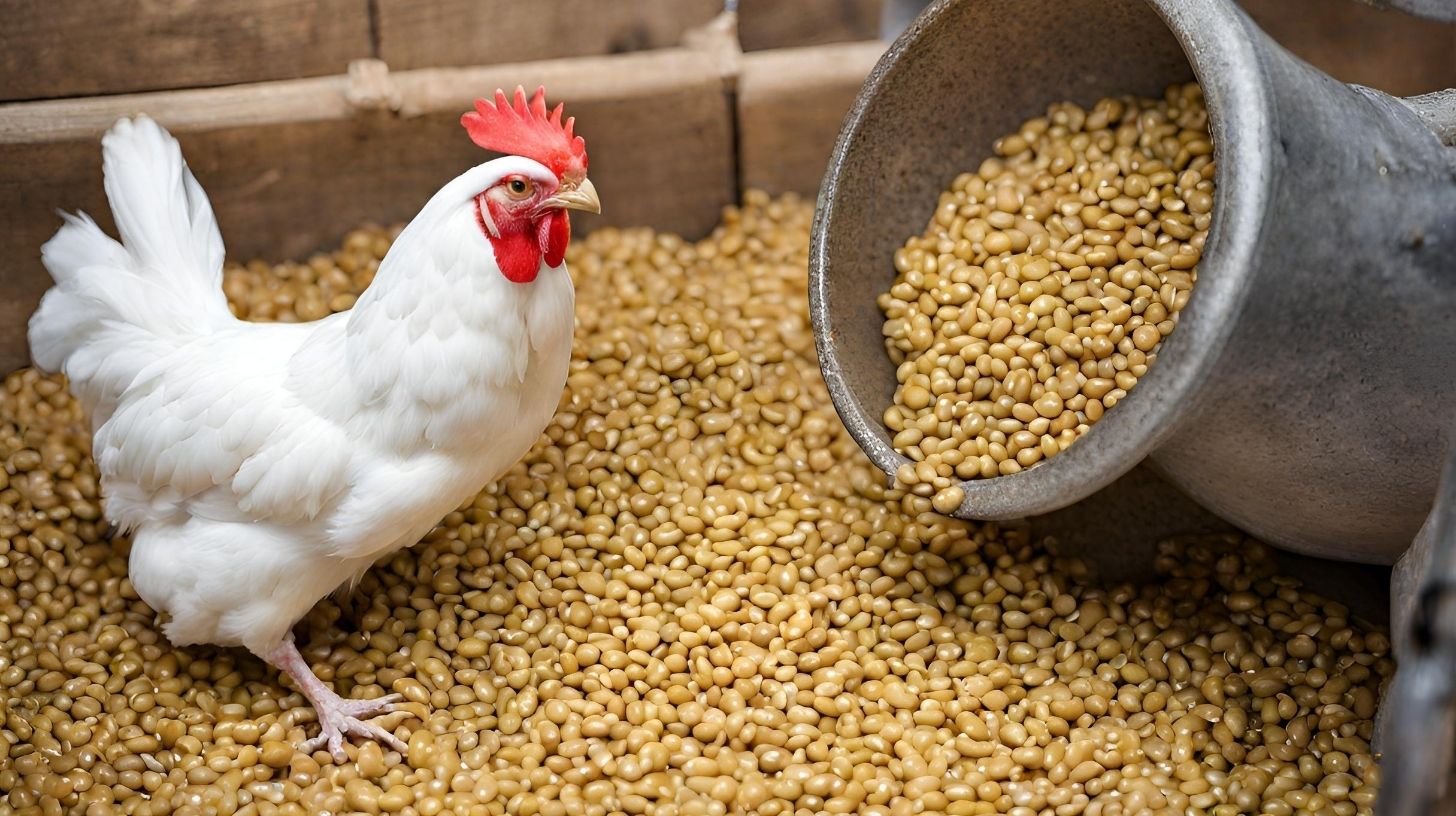 An Overview of Fava Bean Nutrition for Chickens
An Overview of Fava Bean Nutrition for Chickens
Fava beans offer a strong nutritional profile that makes them a great supplemental feed for chickens. Here is an overview of some of the key nutrients found in fava beans:
- Protein: 23-30% protein content, providing essential amino acids for growth and egg production.
- Cholesterol-lowering fiber: Up to 10% dietary fiber helps regulate digestion.
- Vitamins: High in Vitamin B6, folate, niacin, and more. Support red blood cell formation.
- Minerals: Rich source of iron, zinc, potassium, phosphorous, and magnesium. Aid bone strength and egg shell quality.
- Omega-3 fatty acids: Improve immune function and feathers.
- Carotenoids: Antioxidants like lutein support eye and skin health.
When included as part of a varied diet, fava beans can contribute valuable nutrition to support all aspects of chicken health and productivity. From protein for muscle growth to vitamins for digestion, fava beans have much to offer.
Potential Concerns of Feeding Raw Fava Beans
Although packed with nutrition, fava beans also contain several anti-nutritional factors that can cause health issues if consumed raw:
- Tannins: Bind to proteins and minerals, inhibiting nutrient absorption.
- Phytic acid: Blocks absorption of iron, zinc, calcium.
- Vicine and convicine: Can cause severe anemia in low doses. Toxicosis at high doses.
- Flatulence factors: Oligosaccharides cause intestinal gas, diarrhea, and bloating.
Consuming these anti-nutritional factors found in raw fava beans can result in reduced growth rates, poor feathering, diarrhea, constipation, nutritional deficiencies, organ damage, or even death in extreme cases.
Backyard chicken owners should never feed raw fava beans to their flocks. Only properly prepared fava beans are suitable for chicken treats.
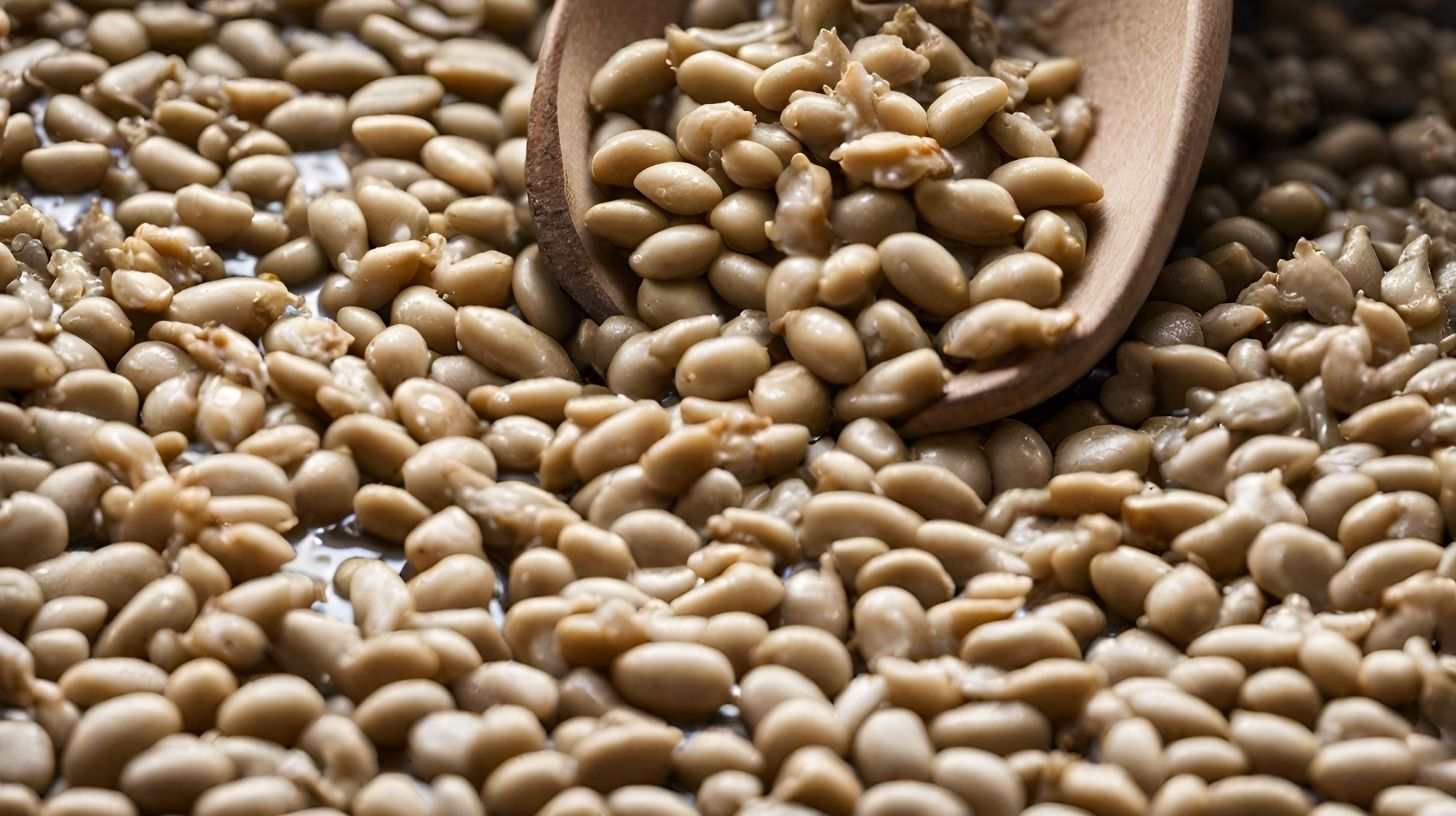 Safe Feeding Guidelines for Fava Beans
Safe Feeding Guidelines for Fava Beans
When soaked, sprouted, or cooked, the anti-nutritional substances in fava beans are neutralized or destroyed, making them safe for consumption. Here are some preparation guidelines:
- Soak beans for 12-24 hours to neutralize toxins, then rinse before feeding.
- Sprout beans over 3-5 days until sprouts emerge to further reduce anti-nutrients.
- Cook beans thoroughly until soft to destroy toxins and increase digestibility.
- Chop/grind beans to aid digestion, especially for smaller birds.
- Feed in moderation alongside balanced feed, no more than 10% of total diet.
- Provide plenty of water to help flush toxins and prevent dehydration.
Preparing fava beans through one of these methods before feeding to chickens can allow them to safely enjoy the nutritional benefits of this bean.
The Nutritional Benefits of Prepared Fava Beans for Chickens
When correctly prepared, fava beans can make a nutritious supplemental feed for backyard chickens. Here are some of the benefits that prepared fava beans offer:
- High protein for growth, muscle development, and egg production.
- Vitamins and minerals like iron, calcium, and B vitamins to support egg laying, reduce stress, and boost immunity.
- Omega-3 fatty acids to improve feather quality and sheen.
- Fiber and prebiotics to promote good gut bacteria and digestion.
- Carotenoids like lutein for enhanced orange egg yolk color.
- Economical source of nutrition when purchased dry in bulk. Can be grown at home.
Feeding fava beans in moderation provides a cost-effective way to diversify nutrition for optimal chicken health and productivity.
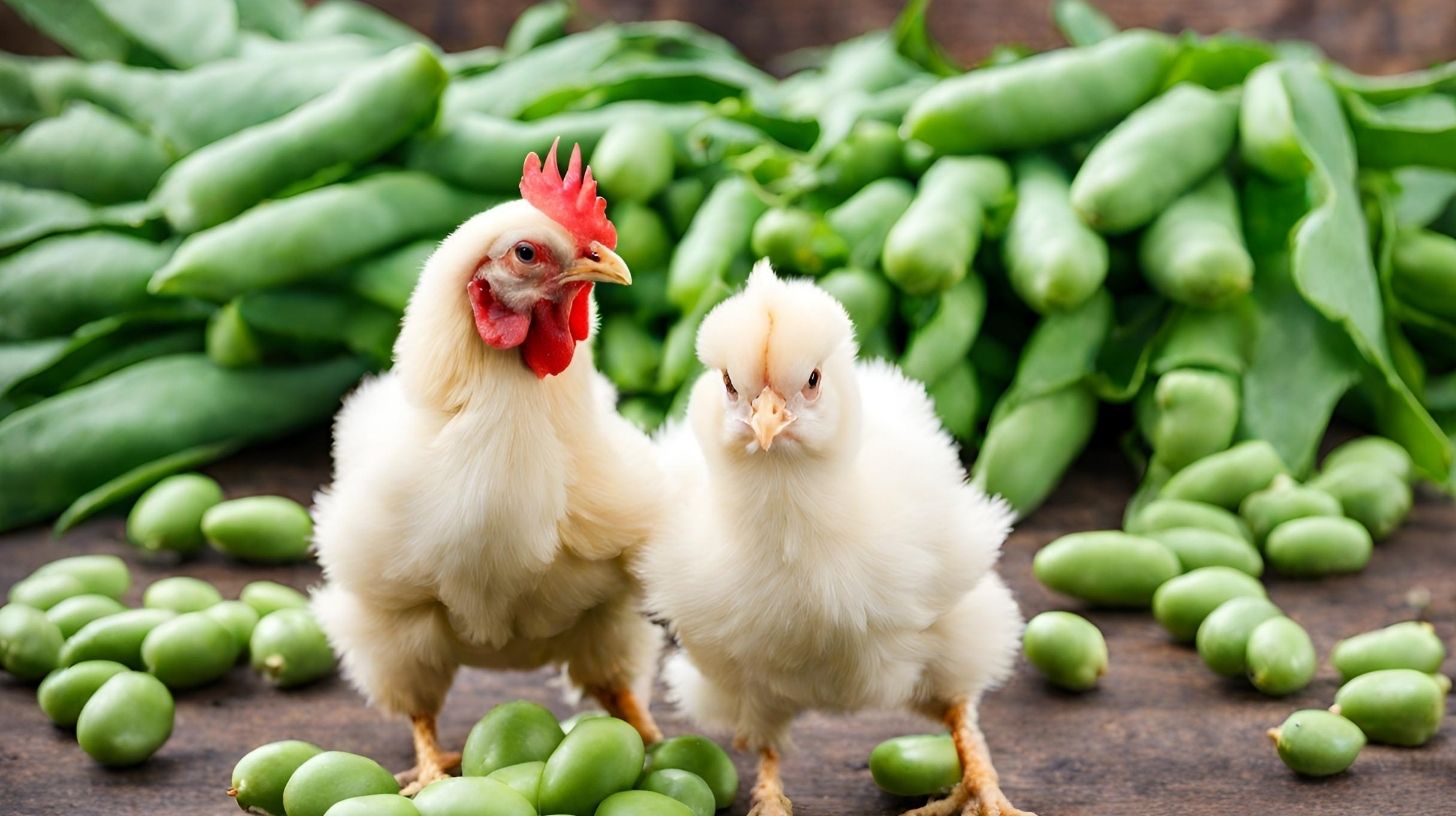 Feeding Fava Beans to Chickens in Practice
Feeding Fava Beans to Chickens in Practice
When adding fava beans to your chickens’ diet, keep these feeding tips in mind:
- Mix soaked, sprouted, or cooked beans into a balanced feed ration or scratch grains. Do not feed beans alone.
- Offer beans in the morning when metabolism is highest.
- Limit beans to 1-2 times per week to avoid overconsumption of anti-nutritional factors.
- Feed beans to adult birds; chicks may struggle to digest beans.
- Chop boiled beans for smaller breeds; leave whole for larger chickens.
- Ensure plenty of fresh water is always available when feeding beans.
- Watch for signs of digestive upset like diarrhea, lethargy, or poor appetite and discontinue beans if occurs.
With proper precautions, backyard flock owners can safely incorporate nutritious fava beans into their chickens’ diets. Observe birds closely and adjust amounts given based on consumption and health.
Frequently Asked Questions about Feeding Fava Beans to Chickens
Many chicken owners have additional questions about the safe use of fava beans. Here are answers to some frequently asked questions:
Can chickens eat fava beans?
Yes, chickens can eat fava beans, but only if they are first soaked, sprouted, or cooked to destroy anti-nutritional factors. Raw beans should never be fed.
Are fava beans good for chickens?
Prepared properly, fava beans are an excellent source of protein, fiber, vitamins, and minerals for chickens. But incorrect feeding can be harmful.
Are fava beans safe for chickens?
Fava beans are safe for chickens if soaked, sprouted, or cooked before feeding to reduce toxins. Feed beans in moderation alongside balanced feed.
What do chickens eat besides corn?
Chickens enjoy a diverse diet including vegetables, fruits, bugs, grains, and protein sources like beans, peas, or mealworms in addition to corn.
What vegetables can chickens eat?
Chickens can eat most vegetables like greens, squash, root veggies, peppers, peas, and beans in moderation. Broccoli, cauliflower, and cabbage are other great options.
Can chickens eat beans and legumes?
Yes, beans like fava, soybean, pea, lentil, and chickpea can all be fed to chickens if properly prepared by soaking, sprouting, or cooking before feeding.
Can chickens eat all vegetables?
Chickens can eat most veggies, but some like raw potato peels, onions, or tomato leaves contain toxins and should be avoided. Introduce new vegetables slowly.
What foods are poisonous to chickens?
Avocado, uncooked bean varieties, potato sprouts, salty foods, dried or undercooked beans, green potato skins and certain leaves are poisonous to chickens.
Are beans good for chickens?
When correctly soaked, sprouted, or cooked, most bean varieties like fava, soy, and peas offer protein, fiber, vitamins and minerals that are good for chicken health. But improper feeding can be harmful.
Can chickens eat raw fava beans?
No, chickens should never consume raw fava beans. Raw beans contain toxins that can be harmful. Fava beans must be soaked, sprouted, or cooked before feeding to chickens to neutralize toxins.
Should I soak or cook fava beans before feeding?
It is recommended to soak beans for 12-24 hours or cook thoroughly until soft before feeding to chickens. Sprouting beans for 3-5 days is another safe preparation method. This reduces anti-nutritional compounds.
How often can chickens eat fava beans?
Limit fava beans to 1-2 times per week at most. Beans should not make up more than 10% of a chicken’s total diet. Feeding beans too frequently can lead to nutritional imbalances.
Can baby chicks eat fava beans?
No, fava beans are not recommended for baby chicks under 16 weeks old. Their digestive systems are too immature to properly process beans. Wait until chicks are grown before introducing small amounts of prepared beans.
What other beans can chickens eat?
Other bean varieties like soybeans, chickpeas, peas, and lentils can also be fed to chickens when soaked, sprouted, or cooked. Avoid feeding raw beans or bean plants which contain toxins.
Conclusion
When included as part of a balanced diet and fed in moderation, fava beans can serve as a beneficial supplemental feed for backyard chickens. Their dense protein and nutrient content contribute to optimal chicken health and productivity when prepared properly.
By taking care to soak, sprout, or cook fava beans before feeding, chicken owners can safely unlock the nutritional benefits of this legume for their flock. Observe birds closely for any signs of digestive upset and adjust amounts fed as needed.
Welcome. I’m Adreena Shanum, the proud owner of this website, and I am incredibly passionate about animals, especially poultry. I founded adreenapets.com as a labor of love, stemming from my desire to share my knowledge and experiences with poultry enthusiasts worldwide.


